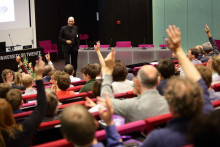‘The police likes to think it is in charge, but is that really true? If the police is on the scene when the crime occurs, it is mostly coincidental’, Elle de Jonge began his speech. ‘However, we are aiming to change that and work towards predictive policing.’ Predictive policing in cooperation with the public, to be more precise.
Calling police via social media
Social media play a huge role in our lives and sharing information, and so they could also help in preventing and solving crimes. If it only was that simple. Let’s say somebody tweets about a crime they supposedly witnessed, should the police automatically respond?
As we all know, disinformation and false statements spread very easily on social media. Also, there is an enormous amount of data on the internet. ‘The real issue is to make something out of all the data we get’, explained De Jonge. ‘We first need to use correlation, complex event processing, before we get any actionable data.’
Network of participation
For those reasons, the Dutch police uses a linear approach towards communication with the public. At the moment, the only sure way to contact the police is by phone. ‘I believe we need to change this approach and move to a network of participation, so people can ask for help also by text messages or Facebook, for example’, said de Jonge.
Such network approach would not only benefit the citizens, but mainly the police. ‘Nowadays, 85% of crimes are solved "in the act" and that is thanks to citizens. That is why we need participating society, in which the civilian represents a partner to the police and the police participates in the public space’, explained de Jonge.
More citizen initiatives
What is the way forward? De Jonge thinks we need more citizen initiatives that use available technology and social media to participate in stopping crimes. In fact, the Dutch police has already tested such citizen participation systems, meaning online systems that allowed people to report crimes.
According to Elle de Jonge, these pilots showed that the public truly wants to be involved, but using such platforms also brings issues and the police isn´t ready for it yet. ‘In any case, the police definitely needs to change’, concluded the Chief-Inspector.







